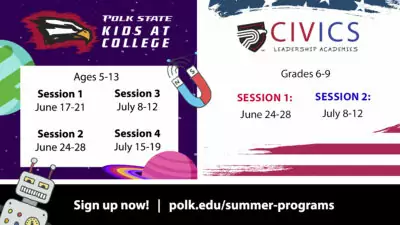Degrees and Certificates
Polk State College offers a variety of degrees and certificates including bachelor degrees, associate degrees, college-credit certificates, and vocational certificates.
Polk State College’s Bachelor of Applied Science (BAS) in Supervision and Management program equips students with advanced training in accounting, strategic planning and decision-making, finance, business law, management, and marketing. The BAS offers five concentration tracks: Business Administration, Business Information Technology, Healthcare Administration, Public Administration, and Public Safety Management. This program is for those with an associate’s degree or the equivalent.
The Bachelor of Science in Criminal Justice is open to anyone with an associate’s degree or the equivalent, regardless of whether they previously studied criminal justice. The program’s curriculum includes corrections, criminal investigations, the court system, criminal justice administration, and deviant behavior.
The Bachelor of Science in Nursing degree is for registered nurses who want a competitive edge in direct-care nursing or want to qualify for career advancement opportunities. This degree emphasizes nursing leadership and professional development.
Both the Bachelor of Science in Early Childhood Education and in Elementary Education prepares teacher candidates for a fulfilling career as a full-time classroom teacher. These degree programs reinforce coursework-developed skills and knowledge with real-world experience. Both bachelor degrees build upon fundamentals of the Early Childhood Education and Management associate’s degree.
The Bachelor of Science degree in Aerospace Sciences at Polk State College is designed to provide students with a holistic, operational study of the U.S. and international aerospace systems. All students participate in a common program core before specializing in either a Professional Pilot or Aerospace Administration concentration, both of which culminate in a capstone course, which encourages students to implement their theoretical mastery of the degree content in an operational context.
The Associate in Arts degree is for those who intend to pursue a bachelor’s degree. Programs of study leading to the AA degree consist of a general education component of 36 hours, as well as 24 credits of college-transfer electives, for a total of 60 credits.
The Associate in Science degree is designed to lead directly to employment opportunities in various fields, from the health sciences to public safety. While AS graduates are prepared to immediately enter the workforce, their degrees also qualify them to apply to Polk State’s BAS and Bachelor of Science in Criminal Justice programs. Students who earn an AS in Nursing are qualified to apply for the College’s BSN program. Students who earn an AS in Early Childhood Education and Management gain a fundamental understanding that prepares them for either of the Bachelor of Education degrees offered at Polk State College.
Polk State’s variety of college-credit and vocational certificates give students a competitive edge in the workforce, whether they are just beginning on a career path or seeking advancement in their current fields.
Polk State College offers a number of different degrees and certificates leading to professional licensure. Some professions require both the completion of a degree and additional criteria such as licensure exams, field experiences, or clinical hours. If an individual’s goals include a specific license or certification, he or she must be aware that state requirements vary.
Polk State College is approved to offer online and in-person academic programs to individuals outside of the state through its participation in the National Council for State Authorization Reciprocity Agreement (NC-SARA). The NC-SARA provides a voluntary, regional approach to state oversight of postsecondary distance education. Institutions that are members of the NC-SARA are authorized to provide online education to students from all NC-SARA-member states.
Polk State College cannot pledge that a selected degree program meets the specific educational requirements for professional licensure in all states, as these can change. If the student contacts the specific academic program to inquire, more information can be provided about a given state’s requirements. The director can provide program-specific information with regard to the individual’s state of residency.




